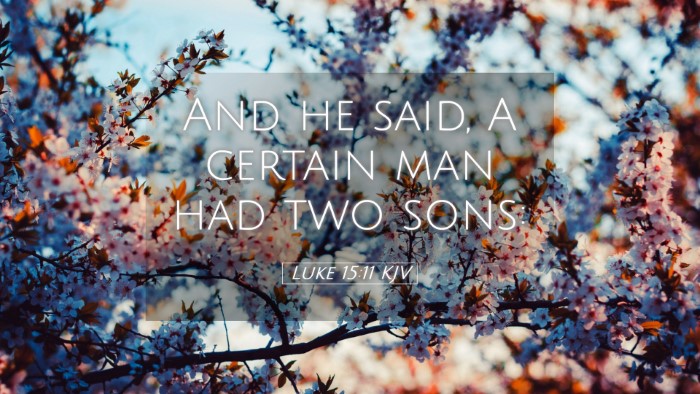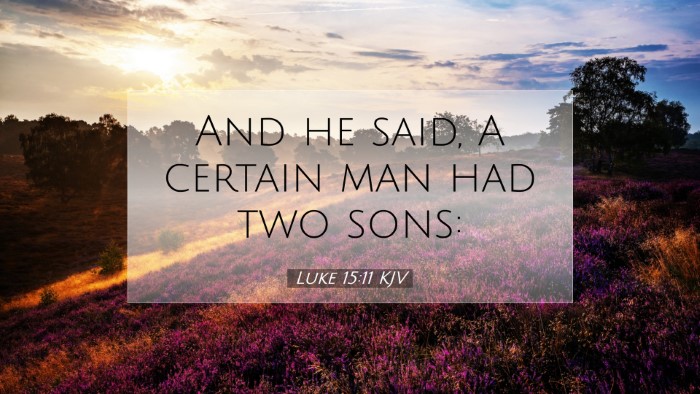Commentary on Luke 15:11
Luke 15:11 states: “And he said, A certain man had two sons.” This verse introduces one of the most famous parables of Jesus, often referred to as the Parable of the Prodigal Son.
In this commentary, we delve into the nuances of this verse and its surrounding context, drawing insights from esteemed public domain commentaries.
Overview of the Parable
The parable begins with the statement of a father's relationship with his two sons. This relationship serves as an allegory for God’s relationship with humanity. The central theme revolves around the concepts of grace, repentance, and the rejoicing that comes with redemption.
Understanding the Characters
-
The Father: He represents God, displaying traits of love, patience, and forgiveness. His readiness to accept his son back is a profound reflection of divine grace.
-
The Younger Son: This son embodies the human tendency to stray and seek fulfillment outside of the father's house. His choices represent the broader human condition of rebellion against God.
-
The Elder Son: He symbolizes the self-righteous or those who believe they can earn their way into God’s favor. His reaction to the father's joy over the return of the younger son reveals the struggle with jealousy and entitlement.
The Significance of "Two Sons"
The presentation of two sons is pivotal. It illustrates the duality of human experience: those who indulge in sin and those who adhere to moral codes.
According to Matthew Henry, "This outlines the diversity of human responses to divine generosity." Each son has a unique journey, yet both require the father's love.
Socio-Cultural Context
In the cultural backdrop of Jesus' audience, the actions of the younger son—asking for his inheritance before the father's death—were scandalous. As noted by Albert Barnes, such behavior was viewed as utmost disrespect and a rupture of familial bonds.
This context heightens the gravity of the son's decision and elucidates the depth of the father's love in the aftermath of such a betrayal.
Key Themes in the Parable
-
Grace and Forgiveness: The father's unconditional acceptance of the wayward son showcases the essence of divine mercy. As Adam Clarke notes, "No sin is too great that cannot be washed away by the blood of Christ."
-
Repentance: The younger son’s return signifies a shift from rebellion to humility. In verse 17, he 'came to himself,' which symbolizes the awakening of conscience often seen in personal conversion experiences.
-
Celebration of Redemption: The father's joyous reception of the son illustrates the heavenly rejoicing that takes place when one sinner returns to God. This theme resonates throughout the Gospels as Jesus emphasizes the joy over lost souls being found.
Exploring the Father's Response
The father's actions—running to meet the son, embracing him, and preparing a feast—epitomize divine love. According to Matthew Henry, “This showcases that even the most grievous offenders are welcomed back with open arms.”
The feast symbolizes the celebration of salvation, underscoring the idea that in the Kingdom of God, those who repent are received with joy rather than condemnation.
Implications for Believers
For pastors and theologians, this parable offers profound theological implications regarding the nature of God. It challenges the church to embody the father’s heart towards the lost and wayward.
The elder son’s resentment serves as a cautionary reminder to remain humble and grateful for grace.
Conclusion
The parable of the Prodigal Son, beginning with "A certain man had two sons," invites readers to reflect on their relationship with God, the nature of repentance, and the joy of reconciliation.
As believers, we are called to reflect both the grace extended to us and the joy of inviting others into the family of God.
With insights drawn from Albert Barnes, Matthew Henry, and Adam Clarke, we are reminded that this is not merely a story, but a transformative truth relevant to our lives today.


